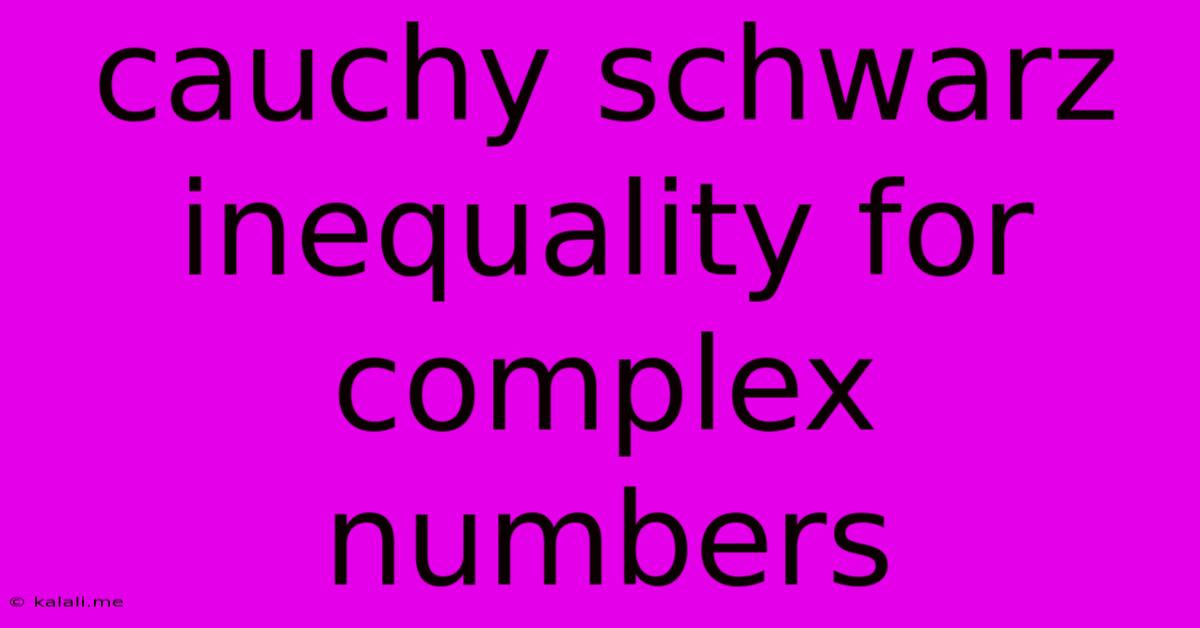Cauchy Schwarz Inequality For Complex Numbers
Kalali
Jun 07, 2025 · 3 min read

Table of Contents
Cauchy-Schwarz Inequality for Complex Numbers: A Comprehensive Guide
The Cauchy-Schwarz inequality is a fundamental inequality in mathematics with far-reaching applications in various fields, including linear algebra, probability, and analysis. While commonly introduced with real numbers, its extension to complex numbers offers even greater versatility and power. This article provides a comprehensive explanation of the Cauchy-Schwarz inequality for complex numbers, exploring its proof and highlighting its significance. Understanding this inequality is crucial for anyone working with complex vector spaces or inner product spaces.
The Cauchy-Schwarz inequality states that for any two vectors u and v in a complex inner product space, the following inequality holds:
|⟨u, v⟩|² ≤ ⟨u, u⟩⟨v, v⟩
where ⟨,⟩ denotes the inner product. This inequality establishes an upper bound on the magnitude of the inner product of two vectors in terms of their individual norms.
Understanding the Components
Before diving into the proof, let's clarify the key components:
-
Complex Inner Product Space: A vector space over the complex numbers equipped with an inner product. The inner product is a function that takes two vectors as input and returns a complex number, satisfying specific properties (linearity in the first argument, conjugate symmetry, and positive-definiteness).
-
Inner Product (⟨u, v⟩):** This represents the inner product of vectors u and v. For complex vectors, it's defined differently than the dot product for real vectors, incorporating complex conjugation. For example, if u = (u₁, u₂) and v = (v₁, v₂), the inner product is ⟨u, v⟩ = u₁v₁* + u₂v₂*, where v₁* and v₂* are the complex conjugates of v₁ and v₂ respectively.
-
Norm (||u||): The norm of a vector u is defined as ||u|| = √⟨u, u⟩. It represents the "length" or magnitude of the vector.
Proof of the Cauchy-Schwarz Inequality for Complex Numbers
The proof typically involves considering a specific quadratic form and leveraging its non-negativity. Let's outline the steps:
-
Consider the vector: w = u - λv, where λ is a complex scalar.
-
Non-negativity of the norm: The norm squared of w is always non-negative: ||w||² ≥ 0.
-
Expanding the norm: Expanding ||w||² using the properties of the inner product, we get:
||w||² = ⟨u - λv, u - λv⟩ = ⟨u, u⟩ - λ⟨v, u⟩ - λ*⟨u, v⟩ + |λ|²⟨v, v⟩ ≥ 0
-
Choosing an optimal λ: To minimize the expression, we choose λ = ⟨u, v⟩ / ⟨v, v⟩ (assuming ⟨v, v⟩ ≠ 0). This is a crucial step that uses the properties of complex conjugation.
-
Substitution and simplification: Substituting this value of λ into the inequality and simplifying leads directly to the Cauchy-Schwarz inequality: |⟨u, v⟩|² ≤ ⟨u, u⟩⟨v, v⟩
Applications and Significance
The Cauchy-Schwarz inequality has numerous applications, including:
-
Bounding the inner product: It provides a crucial bound on the magnitude of the inner product of two vectors.
-
Triangle inequality: It is used in proving the triangle inequality for inner product spaces (||u + v|| ≤ ||u|| + ||v||).
-
Cosine similarity: In machine learning and information retrieval, it is linked to the concept of cosine similarity between vectors, measuring the angle between them.
-
Linear algebra: It is used in proving various theorems related to eigenvalues and eigenvectors.
-
Probability and statistics: It is used in proving inequalities related to covariance and correlation.
The Cauchy-Schwarz inequality for complex numbers is a powerful tool in various mathematical disciplines. Understanding its proof and implications provides a strong foundation for tackling more advanced topics in linear algebra, analysis, and their applications. Its versatility and fundamental nature make it a cornerstone of modern mathematics.
Latest Posts
Latest Posts
-
How To Send Messages To A Network Interface Using Ebpf
Jun 07, 2025
-
Can You Use Iodized Salt For Brining
Jun 07, 2025
-
Gfci Wont Reset After Power Outage
Jun 07, 2025
-
How To Repair A Leaking Car Fuel Tank
Jun 07, 2025
-
Kitchen Sink Drain Rough In Height
Jun 07, 2025
Related Post
Thank you for visiting our website which covers about Cauchy Schwarz Inequality For Complex Numbers . We hope the information provided has been useful to you. Feel free to contact us if you have any questions or need further assistance. See you next time and don't miss to bookmark.